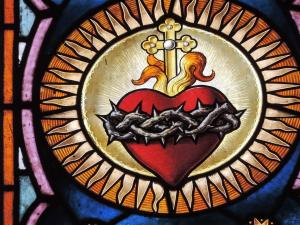
Many people misconstrue the Christian faith and its teaching of salvation because they understand it only with a legalistic mindset. They conceive of sin as they do crimes, that is, sin is only some violation of a law which God put in place. How those laws are established is not clear, especially as it seems each law is promulgated for different reasons. What is clear is that we do not need to know God’s reasons: the law, once it is established, must not be violated, as any such violation requires us not only to be punished, but to make amends for what we have done. That is, God is owed reparations. The problem is that what God is owed is more than we can ever repay, so that every sin can and should lead to us paying it off for eternity, that is, it leads to eternal perdition. Nonetheless, God does not want us to be damned, so God found a way to get beyond that decree, by using, as it were, loopholes around the law. These loopholes allow Jesus, the God-man, to pay back to God what we owe, but only if we let him do so. It is all so legalistic, and though there seems to be a logic to the madness, and with it, even, some elements of truth involved, it is all a legalistic distortion and misapprehension of the greater truth.
The more we consider what this kind of understanding implies, the more we should question it. Why would God need some sort of legalistic loophole if God does not want us to suffer eternal perdition? Shouldn’t God, who made the law, also be able to remove it and its consequences? Is the law more powerful than God that God needs to find a loophole to do what God wishes to do? When Christianity is whittled down to a system of extreme legalistic justice, God’s mercy and grace, God’s love, gets lost. Such a legalistic presentation of salvation, while it might help serve as a basic analogy for those learning the faith, ultimately must give way to a better understanding of God, one which truly embraces the reality that God is love. Salvation must be understood as the work of love. The incarnation is the revelation of God’s love. The incarnation should not be seen as God’s attempt to find a loophole to deal with sin. Rather, it should be seen as God’s intention from the beginning; God loves creation and wants creation to participate in and experience the divine life for itself. Sin interfered with God’s plan for creation, and there had to be some way for it to be overcome, and that can be and is included in the work of the incarnation, but the main point of the incarnation is to establish a real link between creator and creation so that creation has a way of participating in the divine life: And so, Christos Yannaras offers a better way of understanding salvation, “Man’s salvation, his participation in eternal life, is not a legal event; it is a participation in God’s love which gives substance to life.” [1]
Salvation, then, is about our connection with eternal life, which is the life of God, the life of the God who is love. Sin is best understood as the violation of the greatest and truest law, the law of love; insofar as we reject the way of love, our connection to eternal life is affected, for eternal life is meant to be a life in union with the God who is love. Our refusal to love is also a refusal of accepting God’s divine love for us and all the graces which flow from it. What we experience will he mediated by that unlove, and as unlove has no grace, we will find ourselves experiencing more and more pain and sorrow. But because God is love, God does not want our unlove to have the last say. God continues to offer love to all, giving everyone the chance to turn away from sin, from unlove, and experience the embrace of divine love. What we have done with and through our unlove can and will hurt us and others, and so it will need to be dealt with, that is atoned, but such atonement should not be seen through the mantle of legalism and laws, but through love and how love can help undue the violations of love, starting with giving forgiveness to those who ask for it.
The more we engage the good by seeking out and embracing some particular good, the more we find ourselves aimed towards love because goodness and love are one. The more will to do good, the more God will take our good will and use it to help us with the love contained in that goodness. That is, God will pour out graces in that love and use it to strengthen and reinforce us so that we can continue in our pursuit of that which is good. “When he notices good will making an appearance in us, at once he enlightens and encourages it and spurs it on to salvation, giving increase to what he himself planted and saw arise from our own efforts. “[2] That is, God will take every good found in us and love us for it. That love, then, will provide grace, so that those who embrace it will have what they need to turn themselves around from ill-will and unlove and towards love, and then greater and greater love, until at last, in and through that love, they find themselves united with God and experiencing the divine life for themselves. God is consistently offering divine love to everyone, giving everyone various ways to embrace the path of love, and through it, to find salvation:
Therefore the grace of Christ is at hand every day. It calls out and says to everyone without exception, ‘Come to me, all you who labor and are burdened, and I will give you rest,’ because he desires ‘all to be saved and to come to the knowledge of the truth.’ But if he does not call all universally but a few, it follows that not all are burdened by original sin and by present sin and that these words are not true: ‘All have sinned and fall short of the glory of God.’ Nor would it be believed that ‘death has passed through all men.’ And so true is it that all who perish do so contrary to God’s will that God is said not to have made death itself, as Scripture testifies: ‘God did not make death, nor does he rejoice in the loss of the living.’ [3]
God does not desire that anyone should perish, that is, suffer eternal perdition (cf. 2 Prt. 3:9). God loves everyone. God embraces everyone in and through that love. That embrace, indeed, is what led to the incarnation. God the incarnation is the ultimate expression of that love. It is God uniting with humanity so that in and through humanity all creation can find itself one with God. For, in the incarnation, in the assumption of human nature, God the Son assumed a created nature and so shares a nature with the rest of creation. The hypostatic union does not change creation into something it is not, but it allows all within it to find its proper place in eternal life, in the kingdom of God. Divine love built a bridge between creation and the divine nature through the person of the Logos, God the Son. The wounds which unlove, sin, has caused to creation can be healed, though because those who have sinned can’t do it all by themselves, God has seen it fitting to heal creation from within, to partake of it, which God does in the person of God the Son in the incarnation. Salvation is not established through some sort of legal action (or fiction), but through an act of love. It is love which grants freedom. It is love which allows creation to make of itself as it will. It is love which has God to take on what creation created and assume it in the person of God the Son. It is love, not legalism, which our faith centers itself upon.
[1] Christos Yannaras, The Freedom of Morality. Trans. Elizabeth Briere (Crestwood, NY: St. Vladimir’s Seminary Press, 1984), 175.
[2] John Cassian, The Conferences. Trans. Boniface Ramsey, OP (New York: Newman Press, 1997), 474 [Thirteenth Conference; Chaeremon].
[3] John Cassian, The Conferences, 472-3 [Thirteenth Conference: Abba Chaeremon].
Stay in touch! Like A Little Bit of Nothing on Facebook.
If you liked what you read, please consider sharing it with your friends and family!
N.B.: While I read comments to moderate them, I rarely respond to them. If I don’t respond to your comment directly, don’t assume I am unthankful for it. I appreciate it. But I want readers to feel free to ask questions, and hopefully, dialogue with each other. I have shared what I wanted to say, though some responses will get a brief reply by me, or, if I find it interesting and something I can engage fully, as the foundation for another post. I have had many posts inspired or improved upon thanks to my readers.













